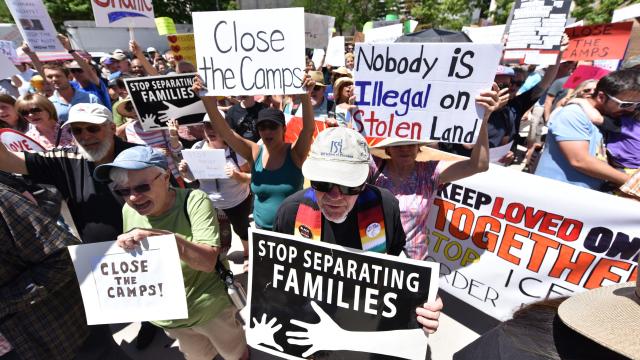Families detained along the U.S.-Mexico border in cramped holding centres are being left completely vulnerable to the flu, CNBC reported last week. Customs and Border Protection (CBP) is currently not vaccinating detainees against the viral disease, nor do they plan to before the upcoming flu season in the country.
The stated policy comes despite an earlier plea by several health experts to reconsider how they treat their detainees, given that at least three children in these camps have recently died with flu-related complications.
On August 1, medical and public health experts from Johns Hopkins University and Harvard University sent a letter to House representatives Lucille Roybal-Allard (D-Cali) and Rosa DeLauro (D-Conn). Both Roybal-Allard and DeLauro are members of the Committee on Appropriations, with Roybal-Allard chairing the Subcommittee on Homeland Security and DeLauro chairing the Subcommittee on Labour, Health and Human Services, and Education.
In it, they noted that three children had died in U.S. custody since December 2018, at least in part due to flu infection — with the youngest victim being only 2 years old. They went on to note that “poor conditions at the facilities may be amplifying the spread of influenza and other infectious diseases, increasing health risks to children,” and that U.S. Homeland Security and Health and Human Services officials may not be following the recommended guidelines for preventing and protecting people in these camps from the flu.
Roybal-Allard and DeLauro soon afterward sent their own letter along with the experts’ letter to the heads of Homeland Security and Health and Human Services, adding that their own inspections of these facilities earlier that July had left them with similar concerns.
But when CNBC asked CBP about their vaccination policy, the agency blankly stated that it has no plans to change anything.
“In general, due to the short-term nature of CBP holding and the complexities of operating vaccination programs, neither CBP nor its medical contractors administer vaccinations to those in our custody,” a Customs and Border Protection spokeswoman told CNBC over email.
The CBP claims that people are only supposed to be kept in these facilities for a maximum of three days. Afterwards, children without parents are sent into shelters managed by Health and Human Services, where they’re supposed to get vaccinated as needed.
But according to Joshua Sharfstein, a public health expert at John Hopkins and one of the letter’s six signers, CBP’s rationale makes little sense, given what often actually happens to people there.
“CBP is wrong to not offer flu vaccine,” he told Gizmodo via email. “Many children and families wound up spending more than three days in CBP custody. But even if they only spend three days with CBP, the earlier they receive the vaccine, the faster they will be protected from a potentially serious and even lethal infection. Moreover CBP should vaccinate its staff and contractors so they do not pass influenza to children and families.”
Flu isn’t the only major and preventable health threat facing undocumented residents and families captured by the government. Outbreaks of chickenpox and mumps among adult immigrants have similarly spread like wildfire in facilities managed by Immigration and Customs Enforcement, thanks in no small part to the overcrowded and unsanitary conditions.
This isn’t the first time the U.S. government has tried to abdicate any responsibility for the health of people in their custody — just this past June, the U.S. Justice Department argued in federal court that agencies like CBP weren’t obligated to provide toothbrushes, toothpaste, or soap to migrant kids in their camps, nor provide anything like a cot or bed for children to sleep on.
